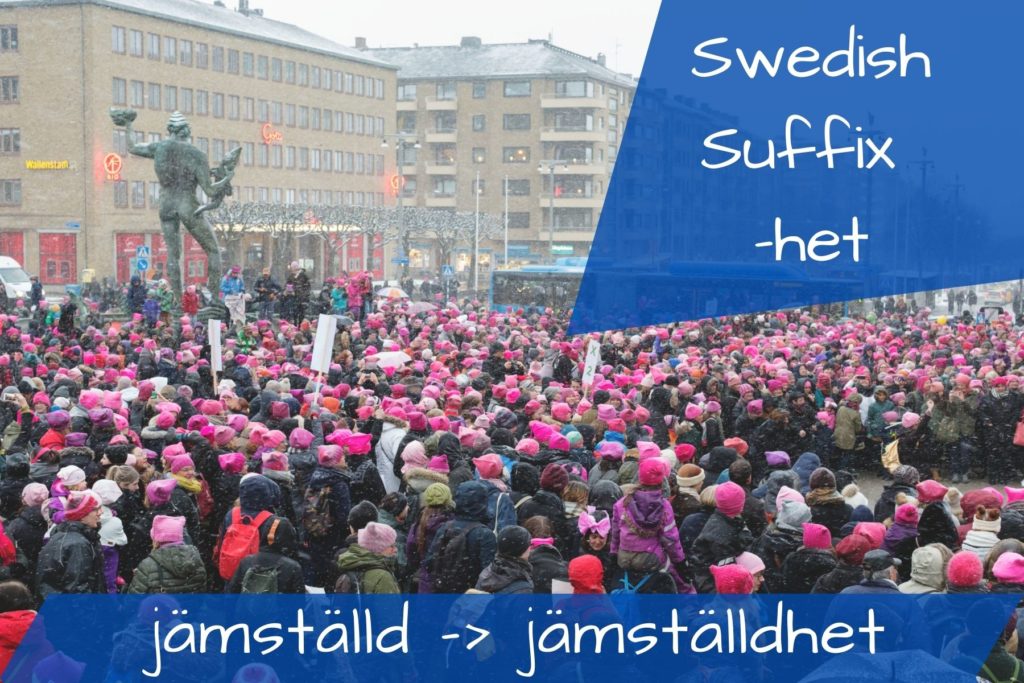Transforming Words with Swedish Suffix -het Posted by Chelsea B on Sep 24, 2020 in Culture, Swedish Language, Vocabulary
Ärlighet, öppenhet, verklighet… Honesty, openness, reality. These dynamic words are made possible by the Swedish suffix -het. Its English equivalents are -ty, -ity, and -ness, making it a noun-forming suffix. The three-letter addition of -het transforms simple adjectives into big-concept nouns. Words ending in -het are excellent additions to your intermediate and advanced vocabulary lists.
An Old Swedish suffix, –het was adopted from German’s -heid and English’s -hood. Because -het is a noun-forming suffix, it is able to shift the word’s meaning and part of speech. For example, the adjective vilsen means lost. Adding the suffix -het changes the word to vilsenhet, or forlornness.
The most common endings associated with -het is -ity or -ty
nödvändig → nödvändighet
necessary → necessity
ärlig → ärlighet
honest → honesty
Once the noun has been created, it takes the Swedish article en and is declined in this way:
stillhet → stillheten → stillheter → stillheterna
stillness → the stillness → stillnesses → the stillnesses
Overarching vocabulary pertaining to society, systems, politics, and philosophy, sort of “big picture” nouns, use the -het suffix. Many of them are also collective nouns:
allmänhet → general public
jämlikhet → equality
jämställdhet → equality, often refers to gender equality specifically
mänsklighet → humanity
svenskhet → Swedishness
myndighet → authority
medvetenhet → consciousness
enhet → unit / entity part of a bigger system, can also be used for “unity”
helhet → in its entirety, wholeness
Egenskaper (characteristics) can be transformed into virtues or vices using -het. When doing this, the base form of the adjective is used (the form associated with en-category nouns), before adding the suffix. For example, the Swedish adjective independent, självständig, has a form for en, ett, and plural nouns:
en-category ett-category nouns plural nouns
självständig självständigt självständiga
We take the base form självständig, add -het, and pang, we’ve got självständighet (independence). As the Swedes would say, “lätt som en plätt”, “easy as pancakes.” 😉 More examples are as follows:
dum → dumhet
dumb → stupidity
fientlig → fientlighet
hostile → hostility
försiktig → försiktighet
careful → caution
girig → girighet
greedy → greed
ödmjuk → ödmjukhet
humble → humility
god → godhet
good → benevolence
Are you having fun shifting parts of speech with -het? Oftentimes, -het nouns are associated with both a verb and a noun, like these:
| ADJEKTIV | VERB | -HET NOUN |
| stor → large | förstora → to increase size | storhet → magnitude |
| blek → pale | blekna → to fade | blekhet → pale/blandness |
| verklig → real/actual | förverkliga → to materialize | verklighet → reality |
| säker → certain | försäkra → to assure | säkerhet → certainty |
Next week is the first post of the month, none other than the music blog! I won’t tell you which song we’re studying, but I will say that these three -het words are in the first verse:
- bitterhet
- verklighet
- äftlighet
Hmm… which song will it be?! Stay tuned!

Build vocabulary, practice pronunciation, and more with Transparent Language Online. Available anytime, anywhere, on any device.




